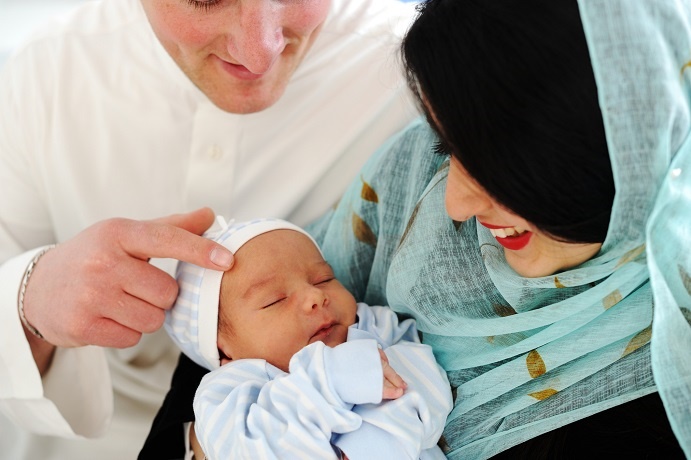
If you've ever wondered whether fasting during the month of Ramadan is permitted while you're pregnant or breastfeeding, this article explains it all.
Read on for details complete with verses from the Quran and the ruling on paying in those missed days.
What the Quran says about fasting during pregnancy or breastfeeding
If because of fasting there is harm caused to the woman or the baby or to both of them, then she may break the fast while she is pregnant or breastfeeding. But if the harm for which reason she is breaking her fast only applies to her baby and not her, then she must make up for the days she missed of fasting and feed a needy person for each day missed. And if the harm only applies to herself, then it is sufficient for her to only make up the missed days.
This is based on the pregnant woman and breastfeeding woman falling under the generality of Allah’s saying: "And for those who can fast (but) with difficulty, they (may break their fast) and instead feed a needy person." [Surah Al-Baqarah: 184]
Al-Haafidh Ibn Katheer (rahimahullaah) said in his Tafseer (1/379): "Amongst those who fall into the meaning of this ayah are the pregnant and breastfeeding women if they fear for themselves or for their children." And Shaikh-ul-Islaam Ibn Taimiyyah said: "If a pregnant woman fears for her fetus, then she may not fast and instead make up each day of fasting that was missed on other days and feed a needy person around 2 kilograms of bread." [Majmoo’-ul-Fatawaa: 25/318]
Also read: Is it safe to fast while I'm pregnant?
Paying in missed days
As with many issues, there is a difference in opinion concerning the ruling on pregnant women and breastfeeding mothers if they do not fast. There are several opinions.
- That they have to make up the fasts only. This is the view of Imam Abu Haneefah (may Allaah have mercy on him). Among the Sahaabah, it was the view of ‘Ali ibn Abi Taalib (may Allah be pleased with him).
- That if they fear for themselves, they have to make up the fast only, and if they fear for their children then they have to make up the fasts and feed one poor person for each day. This is the view of Imam al-Shaafa’i and Imam Ahmad. Al-Jassaas also narrated this from Ibn ‘Umar (may Allaah be pleased with him).
- That they have to feed the poor only, and do not have to make up the fasts. Among the Sahaabah, this was the view of ‘Abd-Allaah ibn ‘Abbaas (may Allaah be pleased with him). Ibn Qudaamah also narrated this in al-Mughni (3/37) from Ibn ‘Umar (may Allaah be pleased with him).
Abu Dawood (2318) narrated from Ibn ‘Abbaas and ‘Ali that this phrase – “those who can fast with difficulty” [al-Baqarah 2:184] was a concession granted to old men and old women who find it difficult to fast, allowing them not to fast and to feed one poor person for each day instead, and the same for pregnant and breastfeeding women if they are afraid. Abu Dawood said: i.e., for their children – they may not fast and may feed (the poor) instead. Al-Nawawi said: its isnaad is hasan.
This was also narrated by al-Bazzaar who added at the end: Ibn ‘Abbaas used to say to a concubine of his who was pregnant: “You are like one who cannot fast, so you have to pay the fidyah but you do not have to make up the fasts.” Al-Daaraqutni classed its isnaad as saheeh, as stated by al-Haafiz in al-Talkhees.
Al-Jassaas narrated in Ahkaam al-Qur’aan that the scholars differed concerning this issue. He said:
The Salaf differed concerning this matter, and there were three points of view. ‘Ali said: they have to make up the fast if they do not fast, but they do not have to pay the fidyah. Ibn ‘Abbaas said: They have to pay the fidyah but do not have to make up the fasts. Ibn ‘Umar said: They have to pay the fidyah and make up the fasts.
Those who said that they only have to make up the fasts quoted the following as evidence:
- The report narrated by al-Nasaa’i (2274) from Anas, that the Prophet (peace and blessings of Allaah be upon him) said: “Allah has waived half of the prayer for the traveler, and fasting, and for those who are pregnant and breastfeeding.” Classed as saheeh by al-Albaani in Saheeh al-Nasaa’i. The Prophet (peace and blessings of Allaah be upon him) stated that the ruling on pregnant and breastfeeding women is like the ruling on the traveler. The traveler may not fast and has to make it up later, and this also applies to pregnant and breastfeeding women. See Ahkaam al-Qur’aan by al-Jassaas.
- Analogy to the sick. Just as the sick are allowed not to fast and have to make it up later, the same applies to those who are pregnant and breastfeeding. See al-Mughni, 3/37; al-Majmoo’, 6/273.
This view was favoured by a number of scholars.
Shaykh Ibn Baaz said in Majmoo’ al-Fataawa, 15/225.
Pregnant and breastfeeding women come under the same ruling as those who are sick. If it is too difficult for them to fast then it is prescribed for them not to fast, but they have to make up the fasts when they are able to do so, like those who are sick. Some of the scholars are of the view that it is sufficient for them to feed one poor person for every day they missed, but this is a weak view. The correct view is that they have to make up missed fasts, just like travelers and those who are sick, because Allaah says (interpretation of the meaning):
“but if any of you is ill or on a journey, the same number (should be made up) from other days” [al-Baqarah 2:184]
He also said in Majmoo’ al-Fataawa, 15/227:
The correct view concerning this matter is that pregnant and breastfeeding women have to make up the fasts, and what was narrated from Ibn ‘Abbaas and Ibn ‘Umar, that pregnant and breastfeeding women have to feed the poor instead, is a weak view that goes against the shar’i evidence.
Pregnant and breastfeeding women are likened to those who are sick, and do not come under the ruling on old men who are unable to fast. Rather they come under the ruling on those who are sick, so they should make up the fasts when they become able to do so, even if that is delayed.
It says in Fataawa al-Lajnah al-Daa’imah (10/220):
If a pregnant woman fears for herself or her foetus because of fasting in Ramadaan, she may break the fast and she only has to make up the missed fasts. In this regard she is like one who is sick and is unable to fast or fears that fasting will harm him.
Similarly if a breastfeeding woman fears for herself if she nurses her child during Ramadaan, or she fears for her child if she fasts and does not breastfeed him, then she may not fast, and she only has to make up the missed fasts.
It also says in Fataawa al-Lajnah al-Daa’imah (10/226):
A pregnant woman has to fast when she is pregnant, unless she fears for herself or her foetus if she fasts, in which case she is allowed not to fast, but she has to make up the missed fasts after she gives birth and becomes pure from nifaas... it is not sufficient for her to feed a poor person instead, rather she has to fast and does not have to feed a poor person if she does that.
Shaykh Ibn ‘Uthaymeen said in al-Sharh al-Mumti’, 6/220, after mentioning the difference of scholarly opinion about the ruling on this matter, and expressing his preference for the view that she only has to make up the missed fasts : This view is the most likely to be correct in my opinion, because at most they are like one who is sick or traveling, who only have to make up missed fasts.
And Allah knows best.
What are your thoughts on fasting while pregnant?
Chatback:
Share your stories and questions with us via email at chatback@parent24.com. Anonymous contributions are welcome.
Don't miss a story!
For a weekly wrap of our latest parenting news and advice sign up to our free Friday Parent24 newsletter.




 Publications
Publications
 Partners
Partners











